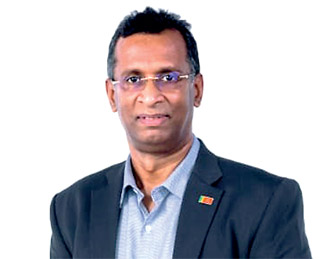Monday Feb 23, 2026
Monday Feb 23, 2026
Monday, 5 July 2021 03:57 - - {{hitsCtrl.values.hits}}
By Nisthar Cassim
 |
| FAAMA President Pubudu de Silva |
 |
| FAAMA Secretary Ashik Lafir
|
The Fabric and Apparel Accessories Manufacturers Association (FAAMA) has urged the Government to give due recognition for its growing value addition to the economy and foreign reserves as required support can help tap a $ 2 billion business opportunity faster
This key sub-sector of the $ 5 billion apparel industry has grown to account for $ 800 million up from $ 500 million a few years ago.
With imported raw materials amounting to $ 3 billion annually, FAAMA believes the local industry can significantly enhance its contribution with the right support and policies.
“The raw material component of the apparel industry is 65%. The import value of $ 2.8 billion signifies a huge gap and equally an opportunity. Whether Sri Lanka can locally produce the entire raw material requirement locally is a challenge and could take a long time. However, local manufacturers have progressed satisfactorily so far after much sustained effort,” FAAMA President Pubudu de Silva told the Daily FT in an interview along with Secretary Ashik Lafir.
He said the fabric and accessories segment is adding a lot of value to the apparel industry.
“Our value addition has increased from 30% to 50% over the five years. Additionally, we are limiting the outflow of foreign exchange from the country,” he said.
“Additionally, customers are preferring in-country sourcing by their suppliers/producers as part of efforts to manage the rising logistics cost as well as lead time. This dynamic certainly helps local manufacturers of fabric and accessories,” de Silva pointed out.
“Given these compelling factors there must be unwavering support to fabric and accessories manufacturers to further enhance their contribution which will benefit the country substantially. Apparel industry, including fabric and accessories, must receive a similar thrust or priority like for tourism or ICT,” FAAMA President emphasised.
To expand the local manufacturing, several new initiatives have been made, including the establishment of a dedicated Eravur fabric park in the Eastern Province, which FAAMA welcomed.
However, FAAMA is of the view that a broad infrastructure plan aligned to industry growth forecasts and goals will help. A level playing field in terms of cost as against overseas competitors is also important, it said.
The Government has set an ambitious $ 6 billion export target for the apparel sector in 2021. Last year, apparel exports dipped to $ 4.1 billion from $ 5.6 billion in 2019. In the first four months of 2021, textile and garments exports amounted to $ 1.7 billion, up by 28.7% from the corresponding period of 2020 but 8% lower in comparison to 2019.
“Year-to-date (YTD) apparel exports are up as against 2020 but we are still trailing behind the 2019 performance. The priority is to reach the first milestone of 2019 export figure of $ 5.6 billion. Judging by the order book, the industry is likely to revert to 2019 performance,” FAAMA Secretary Lafir said.
However, the overall apparel industry has seen timely execution/delivery as a key challenge due to multiple waves of the COVID pandemic and resultant closures and restrictions.
FAAMA, like its parent Joint Apparel Association Forum (JAAF), reiterated the need for faster vaccination of industry employees to ensure survival, sustain resilience and growth momentum.
“The COVID third wave has impacted production by 40% due to absence of workers and movement restrictions despite bio-secure bubbles created after the second wave. After much delay, the vaccination process has started post-COVID third wave and we hope the industry employees will be fully vaccinated soon as we have seen happening in competitor countries. This is critical for the survival as well as to maintain the resilience and export growth momentum of the industry,” de Silva emphasised.